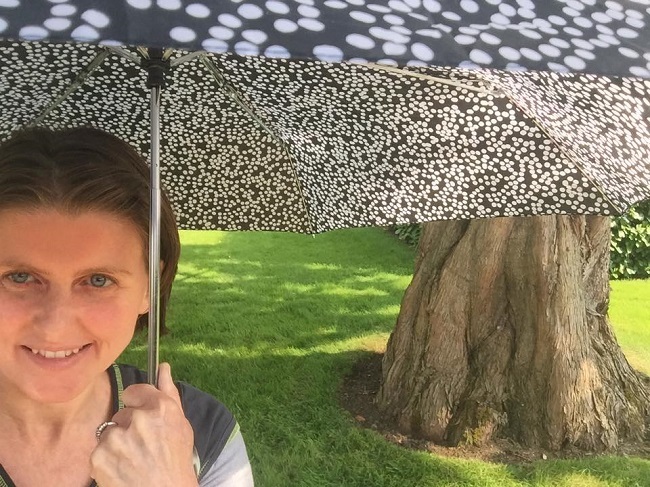Do you have an allergy nurse? Do you even have a specialist allergy consultant? I know many of us adults with life threatening allergies don’t. I myself have never managed to get that referral to an allergy specialist though I am very lucky to have been taken on my Dr John Reed, Dermatologist at Churchill Hospital.
Read on for an insight into what an allergy nurse does day-to-day and I hope you’ll agree, they are total heroes and help to bridge the gap between the specialist diagnosis and medical advice and the big scary wide world of getting on with life with the fear of anaphylaxis.
If you see an allergy specialist you may get to see an allergy nurse, if you’re lucky, and they are often the person who you get to spend more time with, the consultant being rushed of their feet and with only limited time to spend with you.
Earlier this month while I was lucky enough to be speaking at and attending the British Society for Allergy and Clinical Immunology (bit of a mouthful to say that so let’s refer to it as the BSACI), I managed to get an exclusive interview with a specialist allergy nurse. Andrew Williams is an allergy nurse at Guys and St Thomas’s Hospital in London as an Advanced Nurse Practitioner. He has been a huge supporter of my blog, often referring his patients to read it and who I have been lucky enough to meet over the years at these brilliant allergy conferences. He is working with Dr Adam Fox and Dr George Du Toit (pronounced du toy) and has been in this new role for just three months. He has 16 years’ experience working as a nurse at various hospitals but most recently at Homerton Hospital in East London advising and helping both asthma and allergy patients.
His interest in allergy has grown over the years but in his early career where he worked as a charge nurse in respiratory nursing he got to treat patients with severe asthma. It was a tough job with five very young patients dying of asthma in just a two year period. Seeing this happen, not really understanding how or what could have been done to prevent the deaths and feeling quite helpless to make a difference was a tough experience. This is probably where his passion for helping improve people life for for people with life limiting conditions began. He knew he wanted a job which would help him to help his patients and enable them to enjoy better quality of life, despite their condition.
Due to the constraints on the NHS it is easy to only treat the symptoms and ignore the patient but Andrew was beginning to see how the emotional side is just as important in educating patients to stay well and healthy.
I asked him to describe his average day but it seems there is no such thing in allergy nursing and probably in any nursing.
His job involves administering skin prick tests, patch tests and food challenges as well as geting to know the patients to really understand their condition and worries.
He said, “What I love about my job is that no two days are the same. Every patient is completely different, with different triggers, different allergies and different experiences. Allergies are such a complex condition but that just makes it all the more interesting to me.
As an allergy nurse, if you can make positive changes to at least one patient a day it has been worthwhile.”
Andrew begins each consultation by asking his patients some questions so he can find out a bit about them. eg.
- What do you want out of today?
- What are you expecting to happen today?
Sometimes patients don’t know or haven’t even thought about what to expect but nearly every patient isn’t suffering with just one symptom or problem. There are always many and finding out which are the most hard to live with is important in working out suitable treatment plans. The people Andrew sees can have symptoms ranging from bowel problems, skin complaints, irritated eyes, throat itching, nasal discomfort but getting to the bottom of which of these are the main problems for the patient is what’s important.
He see patients with life threatening allergies who have had anaphylactic reactions but also more and more who have oral allergy syndrome; although this is not not be life threatening it can very frightening if you don’t know what’s happening and certainly painful and uncomfortable.
Oral allergy syndrome can cause mouth, throat, lip and facial swelling, itching and pain during the pollen season and can be caused by certain fruit and nuts. eg. hay fever caused by Silver birch and grass pollen.
Andrew sees the biggest challenge as helping people with allergies once they’ve left the hospital, the bridge between the professionals and patients and a 40 minute consultation is not nearly enough for most patients who feel fear, confusion and trepidation about how to cope and live day to day with serious allergies.
Andrew is married with two children. A six year old son Noah who has hay fever to tree pollen and three year old daughter with no allergies who hopefully will miss out on the whole allergy experience.
Andrew himself has cold induced excercise anaphylaxis which he has learned to live with over the years, but which makes one of his hobbies a challenge in the winter. Andrew loves running but when the weather is cold he can’r really risk it as his asthma will be triggered and he could quickly find himself in need of medical attention.
When he isn’t running on warm days he also enjoys singing and I know he enjoyed my recent blog of my Top 10 allergy songs.
So if you’re visiting Guys and St Thomas’s hospital any time soon look out for Andrew and say Hi and if you’re really lucky he might even be your allergy nurse.














Leave a Reply